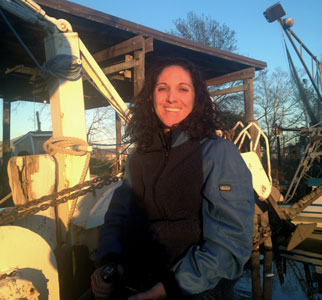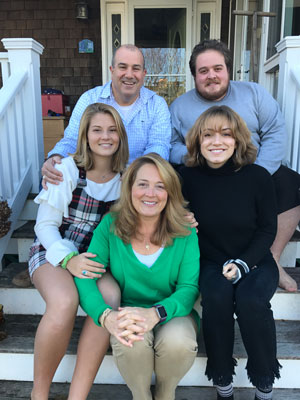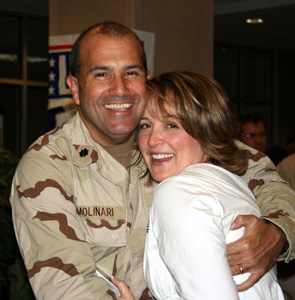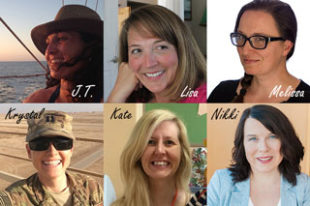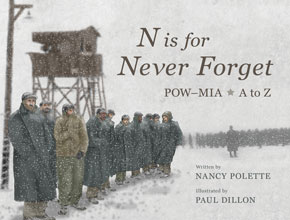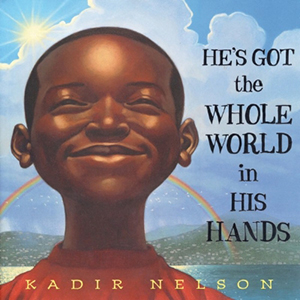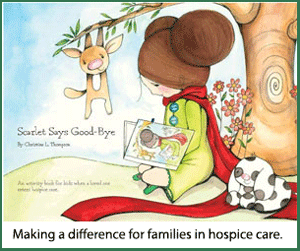Tuscany Writeaway Finalists
In July 2018, the Tuscany Writeaway Scholarship team from Books Make a Difference, Writeaways, and Elva Resa Publishing announced the award of a full scholarship to Army veteran Jenn Tuero (JT) Blatty to attend a weeklong writing workshop in Italy. We also named two top finalists, Lisa Smith Molinari and Melissa Seligman, to receive a one-hour consultation with a senior editor at Elva Resa and the opportunity to submit their manuscripts. Three writers received honorable mention: Krystal McGuiness, Kate Lewis, and Nikki James Zellner. Read the announcement and bios in the July 2018 issue. This month, we hear more from these six talented military-connected women writers in their own words.
JT Blatty
“I was a writer before I was a soldier.”
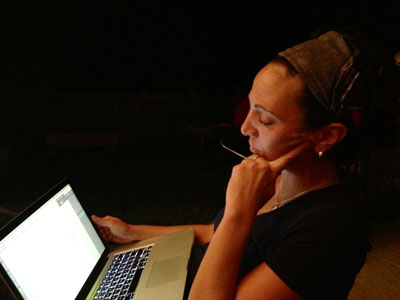
“I was a writer before I was a soldier,” says Tuscany Writeaway scholarship recipient JT Blatty. Photo by Leah Haberer Young.
I was just a rebellious high-school athlete who dreamed of becoming a rock star or authoring a book that would change the world, until I was recruited to play tennis for the United States Military Academy at West Point in 1995, a time when the country was at peace. I decided to go, believing I’d graduate in 2000, serve my five years active duty service commitment in the US Army, and that I’d get out with a résumé that would set me up for life.
I was 23-years old and a platoon leader of 30 soldiers in a combat-heavy engineering unit, just one year into the service commitment when the towers crumbled to the ground. A few months later, I was strapped to the sidewall in the belly of a C-17 military cargo transport aircraft, bracing myself for a tactical landing into Kandahar, Afghanistan.
My writing sample, “Pitch Black,” is from that experience. It’s an excerpt from the over 30,000 words I’ve written called Snapshots Sent Home. It’s about the post-9/11 generation soldiers, and the story of a person who always counted the days until she could break free from the military, only to realize years later that the place she wanted to break free from is the community where she belongs. It’s a story about fear, humanity, patriotism, war, friendship, and how combat changes us. It’s about the universality of soldiers, and how, in the end, combat veterans around the world are connected by a shared experience that transcends the boundaries of nation and conflict.
How has your military background influenced your current projects and your professional path?
This is something I’ve finally started to understand over the last few years––that my time in the military, even though it was only ten years of my life, identifies who I will be for the rest of my life. It’s not just something I can walk away from.
I had a dream of becoming a writer long before going into the military. So I guess it only makes sense that the first book I would try to write, in 2002 when I was in Afghanistan, would be inspired by the events I was experiencing as they were happening. Problem was, I always hit a wall whenever I got to the part about life after the Army. What’s obvious to me now is that I can only write what I’ve experienced and know. So, of course, I couldn’t write the end of a story if I hadn’t lived it yet.
One of the biggest challenges I’ve faced since getting out of the service is coming to terms with this feeling that I’m not measuring up to the work I was doing before, that I lost this sense of purpose in the world, of doing something important. Being responsible for the lives of others in a warzone, being a good leader, even the specific responsibilities I had within my job that I realize now were so huge. I didn’t think about these things when I first got out in 2006 because I didn’t realize how I had changed because of the experience. I just wanted to be free from the machine and pursue the creative streak that was always within me. I was having fun doing things NOT so big and responsible: coaching tennis, building a photography portfolio, trying to figure out what I wanted to do when I grow up. So there definitely came a point where it all slowed down and the inner voice took over. Am I making a difference in the world through my work now? And that voice steered me away from pretty pictures and toward documentary work, stories I felt were important.
What was it like to work on your first documentary project, Fish Town?
Fish Town is a great example of an important story with a purpose. I don’t think I can save the fishing communities from vanishing, but I can make sure there’s something to tell their story once they are gone.
But it was more than that, although I didn’t realize it until later—what drew me to the small fishing communities in Georgia and Louisiana in the first place. When you’re down there in the bayou or on the water or on the boat, it’s almost like the good parts of being on a deployment. No cell phone service, or phones for that matter, just hardworking people. People don’t mind getting dirty and people say what they mean. It’s like being back in Afghanistan or Iraq, during the down time, when life becomes so simple, despite the fact that you’re in a warzone.
I was still living in Savannah, Georgia, after getting out of the Army in 2006. I spent a lot of time over the years while living there befriending an older generation of locals, learning about the secrets of the tidal creeks and hidden diamonds of the low-country, like where to find the giant megalodon shark teeth and other fossils. These old locals inspired the first stories (self-assigned photos and articles) I did for Connect Savannah magazine.
In 2008 I took notice of this new regular occurrence of shrimp trawlers—the same trawlers I loved watching grace the waters with their giant nets—sinking after being left abandoned by owners. I started asking questions and the old locals sent me to Charlie Teeple of Teeple’s Seafood. It was on the outskirts of Savannah, in Thunderbolt, a village I soon would learn was once the shrimping capital of Georgia. I spent tons of time there recording his stories, photographing him and his staff as they deviled crabs and picked lump crab meat and boiled shrimp and told amazing stories about Thunderbolt and other pockets of fishing communities in the low country that once thrived, and it struck me that so much of it was gone without any kind of historic preservation.
In 2010, when the oil spill happened, I felt I needed to go and try to do something. Got a job with the wildlife response folks managing volunteers, and on my days off I explored the bayous south of New Orleans, and made a point to specifically go down to the town where my grandfather used to frequent to get away from the city, and where he drowned on a fishing trip (alone) years before I was born. I wanted to find out more, someone who knew him down there, because no one [in my family] ever seemed to remember anything. I remember flipping through stacks and stacks of black and white Polaroids of him that my mom and aunt showed me. He was always taking pictures. Just snapshots of life and memories. I think we might have been one and the same. A love of the water and capturing memories with a camera.
How has writing and other creative arts made a difference for you in your own life?
It has always been a way to process my feelings about life and the world around me, whether through simple journaling or sometimes poetry. It’s always been a part of me, ever since I was ten-years old and my Dad gave me my first journal.
Even when I was in elementary school, I remember when we learned how to bind our own books with these fabrics that looked like wrapping paper options from the 80s. I thought I was a real novelist (and a Picasso), with these one-sentence pages with scrappy crayon illustrations. I was so proud. The world is so big when you’re little.
I remember always having a camera (usually just a disposable Kodak) in high school and at West Point. I was always moving around, leaving my Dad after a weekend or leaving friends because we were always moving. I wanted to capture something I could keep. Memories. It wasn’t until the deployments that I really remember it playing a valuable role in my life. It was the best way I could share what I was experiencing in my new world that was so far removed from my world at home. I would often send the disposable cameras and rolls of film home when I was gone.
How do your writing and photography interplay now?
Sometimes what I can’t say in words, I can say in a photograph. Sometimes the message needs to be said in words.
Photography is almost another escape from my head, where I’m always thinking too much. I’m so much in the present when I have a camera in my hand.
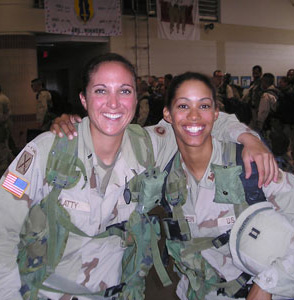
JT with her best friend, Erika Goldstein, arriving back to Hunter Army Airfield in Savannah, Georgia, from Iraq in 2003.
One interesting parallel between the two is the approach, when it comes to the type of artist I realize I am. I’m a terrible fiction writer. I can only write about things I’ve experienced. With photography it’s the same. I’m terrible at staging a photograph. But I’m good at capturing what I see. Now that I think about it, it’s even quite similar with drawing. I can’t draw a stick figure out of my head. But let me look at something, and I can completely replicate it without tracing.
The photos from my deployments have really been instigators for me to return to writing the book I started so long ago. They have become a way for me to remember the things I want to write about. My manuscript title, Snapshots Sent Home, actually alludes to those photos I sent home from the deployments— the disposable cameras and film. A few of the chapters begin with a description of a photograph that sparks a memory.
What’s your next big project?
I’m looking forward to the Tuscany Writeaway, the mentorship opportunity, the guidance that will help me move forward with Snapshots Sent Home and get it out to the world instead of on my computer screen. To leave with confidence and direction to send out book proposals and hopefully secure an agent who believes in the story, who will see the work for what it’s worth and steer me forward.
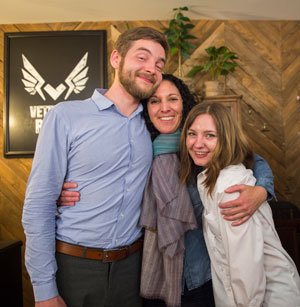
JT in Kyiv, Ukraine, 2018 with Alina Viatkina and Dimitri Lavrenchuk, two of the Donbas veterans she’s been documenting. Photo by Andrew Ashford.
I’m also working on a documentary of the conflict in the Donbas region of Ukraine. This sense of purpose weight is eternal, but this year I think it’s finally putting me in the place where I’m supposed to be, where maybe I always should have been the entire time: Working with soldiers, war, and veterans, everything I wanted to be free of back then. A chance meeting with a fellow West Point classmate at an Army-Navy game in New Orleans last year connected me to the world of Ukraine and the war in the Donbas. We traveled there early this spring to participate in an international summit to help Ukraine develop a Ministry of Veterans Affairs to address the veterans of the ongoing war. During that time, I started a project photographing the volunteer soldiers and veterans of the war, within and outside the conflict zone. It turned my world upside down in more ways than one––but what I’m working on is definitely the most important body of work I feel I’ve ever pursued on a journalism level. It has a true sense of purpose. But all of this is very much tied into the Snapshots Sent Home book I’m writing, almost like it’s the ending chapter in a way.
Feature photo of JT by Linda Tuero Lindsley. Photos courtesy JT Blatty.
Web: JTBlatty.com
Facebook: /JTBlatty
Twitter: @JTBlatty
Instagram: @JTBlatty
Lisa Molinari
“I hope my writing helps to close the military-civilian gap through mutual understanding and a common sense of humor.”
As a military spouse and mother of three, I’ve experienced the chaos of modern family life first-hand. Through 24 years of marriage to a Navy man, eleven military moves, periodic deployments, and managing the special needs of our son, writing became my therapy. I published my first humor essay in the Washington Post in 2010, then developed a self-syndicated weekly column that is now published in Stars and Stripes newspaper and about 20 other military newspapers nationwide.
My column, “The Meat & Potatoes of Life”—an often-humorous dissection of marriage, parenting, and everyday life today—was a dream realized. But another goal of mine was to write a book. I’ve spent the last three years compiling a literary sitcom based on my column, about a comical, yet relatable, family searching for meaning in the endless minutia of the modern world.
Why do you think it’s important to share your voice as a military-connected woman?
Military life can be lonely. Thanks to rigorous deployment schedules and frequent moves, we are often separated from our spouses, family members, and close friends. In “The Meat & Potatoes of Life,” my goal is to describe the common experiences of military families. I want military spouses to read my stories and say, “Yes! I relate to that! I eat Pringles when I’m stressed, too!” I hope that my humorous voice as a regular military spouse will help other military families feel less alone, less overwhelmed, less stressed.
How do you hope your writing impacts others?
Because both military and civilians relate to my descriptions of marriage, parenting, and raising a family in the modern world, I hope civilians realize that military families are not a bunch of regimented war-mongers—we are regular folks dedicated to lives of service. We do the same things civilians do—work on our marriages, pay our mortgages, raise our kids, deal with our in-laws—but we do these things while dealing with the unique challenges of military life. I hope my writing helps to close the military-civilian gap through mutual understanding and a common sense of humor.
What do you hope readers take away from you sharing your life journey?
First and foremost, I want readers to laugh. I strive to reveal the absurdities in our modern world, the hilarities of raising a family today, and the ridiculous things we do to cope with it all. But I hope to warm hearts, too. When we sort through the minutia together to find meaning in every-day life, it reveals truths about love and relationships that will, I hope, sometimes bring tears to readers’ eyes.
How has writing made a difference for you in your own life?
I started writing in 2007, during a particularly challenging time when my husband was deployed for a year. Back then, I wrote for myself only—with a pen on a yellow legal pad while watching my kids’ YMCA swim lessons. For me, writing was a way to spill my guts on paper so I could sort through the overwhelming demands of managing a family and household alone. It helped me discover basic truths in the chaos of modern life, so I could see what really mattered, and more importantly, what didn’t. Revealing “the meat and potatoes” of modern life is still the goal of my writing today.
In what ways has writing been a constant through the many changes in your personal life and career?
As a columnist, I have to write every week whether I want to or not. To be frank, there are weeks when I’d rather chew my own arm off than write another column. But I do it, week after week. Aside from feeling a sense of accomplishment and pride, writing every week also helps me to sort through life’s ups and downs.
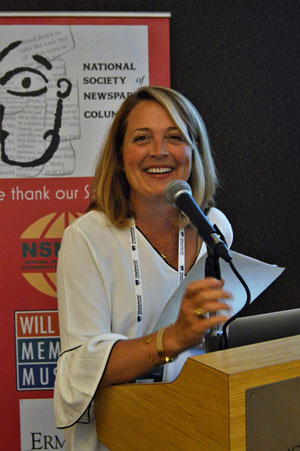
Lisa is a self-taught newspaper columnist. She recently concluded a two-year term as president of the National Society of Newspaper Columnists and now serves on its board.
Have you experienced a favorite moment or special milestone as a writer?
For seven years, I sat at my computer all by myself, learning the art of column writing, tapping out my columns week after week. I painstakingly researched newspaper editors’ addresses and contacted them, pitching my columns, one by one. I had to give away many of my essays for free to get my proverbial foot in the door, only to have it slammed. I faced scores of rejections because “I wasn’t local” (military families are never local for long!) or “there’s no budget for new columns.” But I eventually amassed a tidy number of newspapers who agreed to publish my column in their military markets. Finally, I had a chance to pitch to Stars and Stripes, the Mack-Daddy of all military newspapers, and it worked. I signed a contract with Stripes in September of 2017 and have been honored to connect with military folks all over the world ever since.
How long have you been working on your memoir?
About four years. I joined a local writers’ group, Newport Round Table, where I would submit my work for critique. The group helped me hone my concept and rewrite my stories into a humorous memoir.
Do you write about topics other than military life?
Absolutely. Most of the stories in “The Meat & Potatoes of Life” are not about the extraordinary experiences of military-connected people. I write mostly about the ordinary aspects of marriage, parenting, and family life. But I have the unique perspective of a military spouse. So, when I write about Francis and I arguing over pork chops at dinner, the story has details like his camouflage uniform, our base house, and the green beans I bought at the commissary. So, although military families relate best to my writing because of my military spouse voice, anyone with a sense of humor about raising a family in this crazy modern world will enjoy “The Meat & Potatoes of Life.”
What goals do you have for the next stage of your writing career?
My immediate goal is to make final edits on my manuscript and get my book, The Meat & Potatoes of Life, published. Once that has been accomplished, my next goal is to finally, after 24 years of marriage, get my husband to clean the house and cook dinner so I can go out and sell my book. A girl can dream, can’t she?
Photos courtesy Lisa Molinari.
Blog: TheMeatandPotatoesofLife.com
Facebook: /TheMeatandPotatoesofLife
Twitter: @MolinariWrites
Instagram: @LSMolinari
Pinterest: @MeatandPotatoes
LinkedIn: Lisa Smith Molinari
Melissa Seligman
“I strive to give voice to the journey of healing and what that may look like.”
I began my writing career the moment I realized what words could do for my anger and frustration as a child living in a house with a war-torn Vietnam Vet.
I have four novels in various stages of completion. Each one of them has offered me the chance to heal from my own PTSD, as well as given me space to work through my husband’s deployments and medical retirement.
Not all of my works rotate around military life. But all of them do explore various stages of what it means to find oneself. Whether it is my middle grade fantasy novel, or my dissociative identity disorder novel focusing on what it means to work through traumatic events, I strive to give voice to the journey of healing and what that may look like.
Why do you think it’s important to share your voice as a military-connected woman?
It took me a few years to realize I even had a voice. I think as a military spouse, I often felt my story was boring or average. It wasn’t until I decided to write my book (The Day After He Left for Iraq) that I realized every story matters. That each woman has a voice and the right to use it. While I do not believe my story is unique or special, I do believe speaking gives permission for other women to speak. And sharing my story with hopes of it landing in a space of zero judgment, I also realized it was my obligation to create that space. That is how Her War, Her Voice was born.

As a writer, Melissa Seligman explores various stages of what it means to find oneself and gives voice to the journey of healing. Photo by Melissa’s son at Stratford Upon Avon.
Writing letters helped your marriage during your husband’s deployment. Do you believe writing can transform the lives of other military families?
I completely believe writing can transform the lives of military families. The lives of any family. There is nothing that compares to pen and paper. While technology has served us well in terms of immediate connection, I believe that connection, while good, can often leave us wanting. As quickly as it comes, it disappears. There is no visceral evidence that it happened beyond a memory of the conversation. Letters last as long as we tend to them. There is a physical reaction we have when writing. The smell of the ink. The feeling of scratching the word into paper. The intention that it takes to spell out the words. To craft a dialogue. It is an activity that engages our senses, and therefore, ignites our memory. I have collected every letter my husband and I wrote. As well as the letters to and from our children. Our story is captured in a way that technology cannot compare. And our story will live on as long as we choose to nurture it.
Tell us about your retreats for military families and why it’s important to you.
About eight years ago, I started doing retreats for military families. At first, they were just for military spouses, but as the years have passed, and partnerships have formed, I have had the opportunity to serve Gold Star parents, Gold Star siblings, White Star families, Gold Star widows, and caregivers. The goal of each retreat is to meet the participants where they are. This means that no retreat is the same. And it also means a lot of work to make that happen. I am grateful to have a wonderful team to work with—women who are dedicated to the core belief of Her War Her Voice: Each person has a story and the right to tell it.
I believe healing happens in a community. And I also believe that 17 years of war have taken a toll on our collective military family. The more we can seek to heal, the better we can hopefully emerge on the other side of such a long conflict. While one retreat will not fix the hole that war has left in a family, it is a step to understanding how we can work to better understand what our families need for the future. At least, that is my hope.
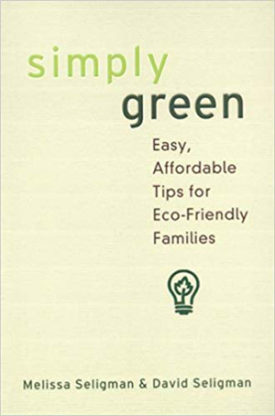 Why is living a green lifestyle important to you and your family?
Why is living a green lifestyle important to you and your family?
I believe it has always been a part of our family. But especially so after my husband returned from relief missions while he was in the Army Reserves, and then what he saw while deployed. I think there is much to life that does not rotate around material things, and the more we can focus on how we are giving back to the earth, the happier we will become. While we are not completely green or self-sustained, it is our goal to one day be.
It was a wonderful experience to work with my husband in writing Simply Green. I think, too often, we believe that doing more for the earth means doing more. When, in fact, it often simply means focusing on what is most important—relationships and family. We have learned how to enjoy our life focused on what we can do together to bond as a family in giving back. That lesson has been one of the most beautiful lessons for us.
In what other ways has writing played an important role in your life?
Writing has always been a part of who I am. It is what I do to process. To document. To express. To create. It has gotten me through every aspect of my life thus far. So for me, personally, my writing is my greatest ally. It is my soul-soother. For my professional life, it has become the way I connect with people. By sharing my story, it has opened the door for me to receive stories. And I can think of no greater gift than to receive another person’s story. It has opened doors to communication that I would have never conceived before writing my first book.
What is your next big writing project?
I have a bit of an issue focusing on one at the moment. I have written four novels. And while I need to keep editing and working on those four, it seems a fifth is ready to emerge. For now, I am working on letting that story come through me for my personal enjoyment, while editing and querying the other four.
What goals do you have for the next stage of your writing career?
I am very hopeful to make the jump from nonfiction to fiction. While I have appreciated the opportunities of writing nonfiction, I have always loved the passion and creativity of fiction. It is my hope to get one of my four novels published.
Photos courtesy Melissa Seligman.
Blog: HerWarHerVoice.com
Facebook: /HerWarHerVoice and /MelissaSeligman
Twitter: @HerWar and @MelSelWrites
Krystal McGuiness
“I find that understanding between humans happens best over discussions of what we read, what we think, and how we feel.”
I carried a small notebook from Okinawa, Japan to Baghdad, Iraq. Writing was one way to process being a leader while occupying a female body in a foreign country that resists your very creation. For six months I sifted pain, confusion, hilarity, and survival.
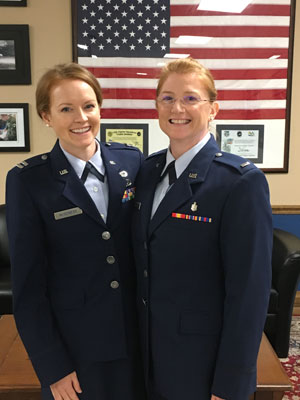
Krystal’s mom was in her initial Commissioned Officer Training at the same location Krystal attended Squadron Officer School. “This was the first time I had seen her in uniform!” says Krystal. Photo by Mindy Van Kuren.
Why do you think it’s important to share your voice as a military-connected woman?
As an active duty Air Force officer, a woman, a military spouse, and as a writer, I find that understanding between humans happens best over discussions of what we read, what we think, and how we feel. I also find that recreating communities wherever I move is challenging! Storytelling with other women becomes a way to connect and learn about the people you will support during a military assignment. My role as a military woman is often community building in nature. Writing allows me to think through alternative perspectives that I would not otherwise have access to. Writing also allows me to recover after the inevitable and inherent failures of any leadership position.
I am surrounded by amazing women in the armed forces. My mom recently joined as an aeromedical evacuation nurse (we wear the same military rank); she travels the world in a cargo aircraft reconfigured as a flying hospital. My grandmother was an airman in the early 1950s, and my aunt retired as a master sergeant. I am so proud to be in a line of Air Force women! In practice, however, the voices of military women are rarely shared. Hollywood favors the white, tall, strapping young man (usually from Texas) as our military hero. He owns the story of “over there.” He is not my story, and I feel a desperate urge to break through what people expect of a veteran’s voice. I returned from Iraq and found an emptiness where I expected a space willing to listen. I found that my stories were not held in equal regard to the “war stories” my male counterparts could share. I think one way to break through this stigma is to become a master at the art of storytelling.
How has writing made a difference for you in your own life?
Most of my military adventures involve isolation; that is, I typically do not know anyone I am traveling or working with until I arrive. I spend time in various training events having emotional, physical, and exhausting experiences with a group of strangers. Then, I return to a bunk and process my day, alone. Writing is one way to break through the loneliness of feeling like your entire being is changing and there is no one around to share it. When I was first tasked for a deployment as a lieutenant, I spent three months training in Fort Polk, Louisiana, with the Army. My deployment was cancelled a few days before I graduated. It would have been easy to walk away feeling like nothing had happened and that I had wasted three months of my life away from my husband, dogs, and the leadership role at my home unit. I was able to sort through this turmoil by reading through pages of my journal; I had collected so many stories, images, and impressions. Leaving myself open to new stories has made me a stronger leader.
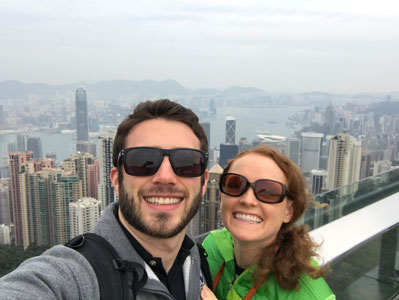
Krystal’s husband, Kevin, is also in the Air Force. She says, “This was taken on a trip to Hong Kong after I returned from my deployment. Military life means more time away than together; adventuring together whenever possible is important.”
Tell us about one of your current writing projects.
I am currently writing about Laren McClung’s collection, Inheriting the War: Poetry and Prose by Descendants of Vietnam Veterans and Refugees. Vietnam is a war that marked generations of Americans. Vietnam is also a war I am not personally familiar with; my parents were children during the primary conflict. I skirted Vietnam’s border on a recent trip to Cambodia. The signs warning of possible land mines reminded me how recent Americans ensured a perpetual mark on the region. McClung’s collection of once-children impacted by the Vietnam War occupies a layer under my skin. I am writing a review that interweaves my personal experiences in a combat zone. Many of the writers in McClung’s collection write about living in war’s shadows, of empty dining room chairs, of searching for answers in the unknowable, deeply personal experience of war. I hope to share this review in the journal, War, Literature and the Arts and will present some of my work at the 2018 War, Literature & the Arts Conference: Representing and Remembering War. I will blend my experience reading McClung’s collection with personal narrative detailing my time as an Air Advisor in Iraq.
What goals do you have for the next stage of your writing career?
Writing outside my journals is relatively new; I am sorting years of raw material and learning how to transition from a reader to a writer. This has been a slow process, and I am working to publish a blog to document the journey. I am most interested in writing creative nonfiction stories that offer a woman’s view of military service. I plan to continue my service in the Air Force and apply for a PhD program that will allow me to return to the United States Air Force Academy as an active duty professor in the Department of English and Fine Arts. I am drawn toward stories that deal with trauma, and especially the generational wounds inflicted by warfare. For now, that means reading with a purpose, and practicing the art of writing like it might be my job someday!
Feature photo of Krystal was taken on an Air Traffic Control tour in Iraq. Photos courtesy Krystal McGuiness.
Kate Lewis
“Being a storyteller is a wonderful gift.”
When my husband got orders to Japan, I left behind a thriving career in public relations. Over the next two years, my articles on Japanese parenting found a home at Savvy Tokyo, a publication aimed at millennial women in Tokyo. I became a finalist in HarperCollins/Avon’s #FanLit writing contest, where my work became the first chapter in a multi-author novella, and I launched The Southerner, a travel blog detailing our adventures around the world.
Now, with two children under four at home, my writing is squeezed into five o’clock wakeups, unreliable naptimes, and bleary-eyed work after both my children have gone to bed.
Why do you think it’s important to share your voice as a military-connected woman?
I think ours is such a unique perspective in these times. Our [service member] spouses make sacrifices to serve the country, and often times, that means we make sacrifices as well—our careers, proximity to family, constant moves. I love writing, and don’t often write on exclusively military-connected topics, but I think having more voices raised is always a wonderful thing.

When Kate’s family moved to Japan, she was fascinated by the differences in culture and approaches to raising children, and created an opportunity to write about those observations.
How has writing made a difference for you in your own life?
I’ve been reading and writing since I was a little kid—I love it! Being a storyteller is a wonderful gift. When we moved to Japan, I was fascinated by the differences in culture and [approaches to] raising children, and created an opportunity to write about those observations for a Tokyo-based lifestyle site, where my pieces were the most popular on the site for two years in a row. Knowing that what I saw and wrote about resonated with so many people was life-changing.
Tell us about your current writing project.
I’m in the middle of writing the first in a four-book spy romance series, set in post-Napoleonic Wars England. A washed-up former field agent falls in love with the recruit he’s meant to train.
What goals do you have for the next stage of your writing career?
I’m currently working with a literary agent in hopes of publishing my spy series. My goals this year are to hopefully place articles and researched pieces on life and parenting in American publications. We’ll see where writing takes me next!
Travel blog: The Southerner
Twitter: @KateHasThoughts
Nikki James Zellner
“I’ve been telling other people’s stories for over 20 years. It’s time to tell my own.”
I didn’t have the best childhood. Brady Bunch on the outside, drinking, neglect and infidelity on the inside.
I heard a term recently: endangered stories, the stories in danger of becoming extinct. The stories that, unless told to someone else, will disappear and be forgotten. It became clear to me that my father was one of those stories.
The book I’ve been working on is titled Slightly Exaggerated: A Collection of Short Stories About My Father. Writing is a way for me to find closure from my past, to let the child within me know it’s okay to love her father regardless of his past indiscretions. If I really want to raise men, I have to start by forgiving the one that raised me.
A therapist once told me, “For every bad memory, there’s, hopefully, a good one to go with it. Remember those, too.” My book idea came from culling up those good memories. Healing, in paperback.
Why do you think it’s important to share your voice as a military-connected woman?
I think it’s important to share your voice, period. So many people don’t, because they don’t feel like they have a story to tell, or maybe because they feel like they’re not a good writer. But in sharing our stories, we become more connected to each other. While I had family members in the service previously, it wasn’t until I married my husband in my late 30s that I really became involved in the military community, and in the spouse community specifically. I found this incredible bond would happen when we heard each other’s stories, and it pushed me to continue sharing my own experiences as a milspouse.
How has writing made a difference for you in your own life?
Hands down, writing is therapy for me. If I’m going through something emotional or difficult, writing lets me have a safe space to just get those thoughts out of my head and into the world. It’s really eye opening to be able to look back on something you wrote about and thought was an incredibly big deal, only to realize reading it a year later how trivial it was or how irrational you were being. So writing sometimes protects me from behaving irrationally, and gives me that outlet for impulsive emotion.
I recently had two pieces that were the most emotional, public pieces I’d ever written. One was an OpEd in relation to the Capital Gazette shooting in Annapolis, Virginia, and the other was the eulogy for my mother’s funeral. They were both unexpected and quick turnaround pieces, and they really helped me reflect and process events happening in my life.
Tell us more about your current writing project.
For the Writeaways competition, I submitted a sample of my work in progress Slightly Exaggerated, a collection of stories about my father, inspired by my own (and his) childhood. I had put many of the pieces of this together when we hadn’t seen each other for any extended period of time in several years, and was working from that frame of mind. With the recent unexpected passing of my mother, I had the opportunity to reconnect with my father. Her death has given me the motivation to make sure my father has an opportunity to not only read it in draft, but to see it published.
What goals do you have for the next stage of your writing career?
I have only recently started putting any writing “out there” in a public space. Goal #1 would certainly be just really getting in the habit of setting aside that daily time to put pen to paper. Goal #2 would be to familiarize myself with what the writing world is really like, including publishing options and workshops. Goal #3: Finish Slightly Exaggerated and publish it.
Twitter: @NikkiJZellner
Instagram: @NikkiJZellner
LinkedIn: @NikkiJamesZellner
Follow more about the Tuscany Writeaway in the Writeaway section of Books Make a Difference. If you are an agent or publisher interested in working with any of these talented writers, please contact our team and we’d love to connect you!
This article was first published September 2018.

